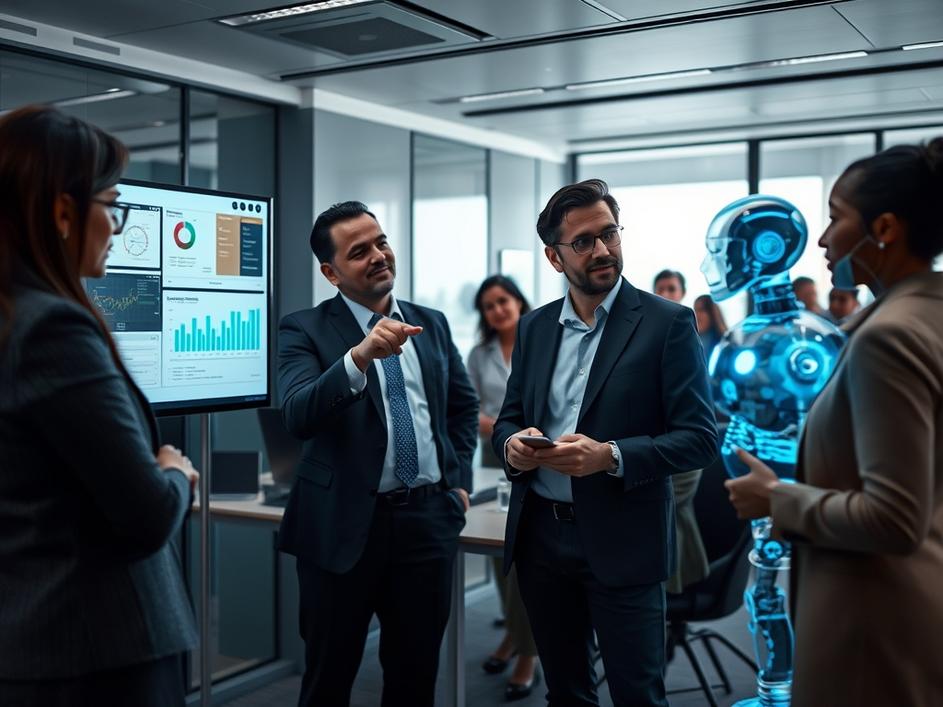


We are a digital agency helping businesses develop immersive, engaging, and user-focused web, app, and software solutions.
2310 Mira Vista Ave
Montrose, CA 91020
2500+ reviews based on client feedback

What's Included?
ToggleIt feels like everywhere you look, someone is talking about artificial intelligence. You hear stories about big tech companies like Meta, Amazon, and Salesforce letting people go, and naturally, people start to wonder: Is AI behind this? Is my job next? It’s a scary thought for many, imagining robots or algorithms taking over tasks that humans have done for years. This fear isn’t new; every big technological leap brings worries about jobs disappearing. But in the middle of all this talk and worry, one very important person is staying surprisingly calm. David Solomon, the head honcho at Goldman Sachs, a massive financial company, isn’t buying into the idea of a huge AI-fueled jobs wipeout. His view offers a different way to look at what’s happening and what might come next for our workplaces.
David Solomon’s perspective is pretty clear: he sees AI as a powerful tool, not a replacement for people. He’s not ignoring AI’s capabilities; in fact, he’s probably thinking deeply about how a company like Goldman Sachs can use it. But for him, the complex world of finance, with its intricate deals, market swings, and human relationships, still needs human intelligence and judgment at its core. He believes AI will make employees more efficient, helping them get through routine tasks much faster. Think about how spreadsheets changed accounting, or how email changed communication. Those tools didn’t get rid of accountants or communicators; they just changed how they worked and what they focused on. Solomon seems to think AI will do something similar, refining jobs rather than erasing them completely. He’s saying that the human touch, especially when it comes to big decisions, remains vital.
When we talk about AI “taking” jobs, we often picture a robot sitting at a desk doing a person’s entire role. But the reality, at least for now, is much more nuanced. Most AI today is very good at specific, narrow tasks. It can crunch huge amounts of data, spot patterns, write basic reports, or answer common customer questions. These are often the repetitive, time-consuming parts of many jobs. So, instead of thinking of AI as a replacement, it’s probably better to see it as a very smart assistant. Imagine a lawyer using AI to sort through thousands of legal documents in minutes, or a doctor using AI to help analyze scans for potential issues. The human is still in charge, making the final call, using their experience and common sense. AI helps them do their job better and faster, letting them focus on the truly human parts of their work, like advising clients, empathizing with patients, or coming up with new strategies.
This leads us to a crucial point: the skills that truly make us human are becoming even more valuable. AI can’t easily replicate critical thinking, creative problem-solving, making complex ethical judgments, or building strong relationships. It struggles with empathy, intuition, and understanding the subtle nuances of human communication and negotiation. In fields like finance, where trust, client relations, and navigating unpredictable global markets are daily challenges, human insight is irreplaceable. A machine can analyze market trends, but a seasoned banker understands the fear or greed driving those trends, or the unique needs of a specific client. These are the soft skills, the “human skills,” that will continue to set us apart and keep us relevant in an AI-powered world. We should be doubling down on developing these abilities.
History shows us that every major technological shift, from the industrial revolution to the internet, has caused changes in the job market. Old jobs fade, but new ones appear, often ones we couldn’t have imagined before. Think about jobs like social media manager, app developer, or cybersecurity expert – these didn’t exist a few decades ago. AI will undoubtedly follow this pattern. We’ll need people to design, manage, and maintain AI systems. We’ll need ethicists to ensure AI is used fairly and responsibly. There will be new roles in data science, AI training, and specialized fields that combine human creativity with AI tools. The key is to understand that the nature of work will shift, not necessarily disappear. Our focus should be on preparing for these new opportunities, not just mourning the potential loss of old ways of working.
So, what does this mean for individuals worried about their own careers? It means leaning into a mindset of continuous learning. The idea that you learn a skill once and use it for your whole career is outdated. In an age of rapid technological change, staying relevant means being open to new tools, new ways of thinking, and constantly updating your skillset. This could mean taking online courses, learning a new software program, or simply experimenting with AI tools in your daily work. Companies, too, have a role to play in offering training and development programs to help their employees adapt. The more we understand AI and how to work alongside it, the less we need to fear it. It’s about becoming a partner with the technology, not just a passive observer.
The fears surrounding AI and jobs are real and understandable. When you see big headlines about layoffs, it’s natural to feel uneasy. But as David Solomon of Goldman Sachs suggests, a more balanced view is likely closer to the truth. AI is a powerful tool, and like all powerful tools, it will change things. It will change how we work, what tasks we focus on, and perhaps even what entire industries look like. But it’s far less likely to simply replace human intelligence and judgment, especially in complex roles that demand creativity, empathy, and critical thinking. Instead of a jobs wipeout, we’re probably looking at a massive job evolution. The real challenge, then, isn’t to stop AI, but to learn how to live and work with it, harnessing its power to make human efforts more effective and fulfilling.



Comments are closed